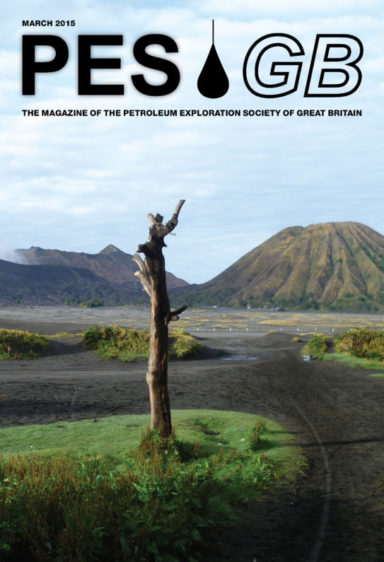PESGB March 2015
- Better Exploration Through Better Geoscience, Hamish Wilson, PESGB President 2015
- New Field Exploration: Highlights and Trends of Recent Years
- To frac, or not to frac?
Plus Much More Inside
Better Exploration Through Better Geoscience…
PESGB President Hamish Wilson argues that industry, government and regulators must all row in time to successfully navigate the North Sea
 Against a backdrop of continuing gloom and funding cuts in the industry, I’m pleased to report that the PESGB met the financial targets for PETEX. Thus at last month’s PESGB Council meeting we agreed to continue to sponsor students attending MSc programmes. We are aiming to support 20 students this year, down from last year, due to lower receipts from PETEX, but still a considerable number. In addition we will continue to fund the Stoneley Lecture (this month) and ESTA.
Against a backdrop of continuing gloom and funding cuts in the industry, I’m pleased to report that the PESGB met the financial targets for PETEX. Thus at last month’s PESGB Council meeting we agreed to continue to sponsor students attending MSc programmes. We are aiming to support 20 students this year, down from last year, due to lower receipts from PETEX, but still a considerable number. In addition we will continue to fund the Stoneley Lecture (this month) and ESTA.
On a separate note, I attended the ‘Pitfalls’ conference held last month, hosted by Oil and Gas UK and Pilot. The key talk at the conference was given by Christian Mathieu of DECC on the interim results from a Well Failure Analysis on the Central North Sea and Moray Firth; a study sponsored by DECC as part of the 21st Century Road map. A theme throughout his presentation was that a number of wells failed on trap models based on errors in seismic interpretation. We also failed to predict the main failure mode in a significant number of cases. These observations have some profound implications:
1. Given that the wells were drilled in error, they cannot be construed as valid play tests. This could mean that portions of the plays that we think have been tested, remain under explored.
2. We don’t understand the geology of some aspects of the North Sea.
Both observations point to the need for the 21st Century Exploration Road Map project (the XRM), not just in the frontier basins, but also to work up some of the core North Sea heartlands.
We might also conclude that too many wells have been drilled. Although not directly stated, many of the poorer wells were drilled by smaller companies perhaps under pressure from their investors to ‘drill wells’. Suggesting that prospects were chosen to meet investor expectations for volume rather than on quality geoscience?
The industry is calling for more government support for exploration, both to fund new seismic acquisition, but also for more favourable tax treatment for exploration costs. If we are to ask the tax payer to assist in exploration then we should expect a challenge to demonstrate that we have an effective quality assurance process to prevent errors.
This presents a powerful case for the regulator to approve the geotechnical work to support a given drilling decision; not to change a risk, but to ensure that the operator’s risk and volume prediction is based on a full appreciation of ALL the available knowledge and data. The country cannot afford many dry or non-commercial wells. Surely our focus has to be on making sure the country drills the best wells from its portfolio and that those wells are drilled on the basis of the highest quality geoscience.
There were further calls for the industry to support work in new plays. I struggle to define the case for industry to invest in new plays, which by exception the industry deem unattractive. Therefore as I have mentioned before on this page, there is strong argument for government to develop investment justifications for new basins. If the case is strong enough, the industry will invest.
It is clear that the relationship between the regulator, oil companies and Oil & Gas UK will be critical to be able to make exploration more successful in the North Sea. However we should expect that future activity levels in exploration will be significantly lower than at present, but deliver much higher returns (i.e. at a lower finding cost with more profitable barrels). This could all change of course if we manage to open up a new play… No pressure on the Exploration Road Map project then!


